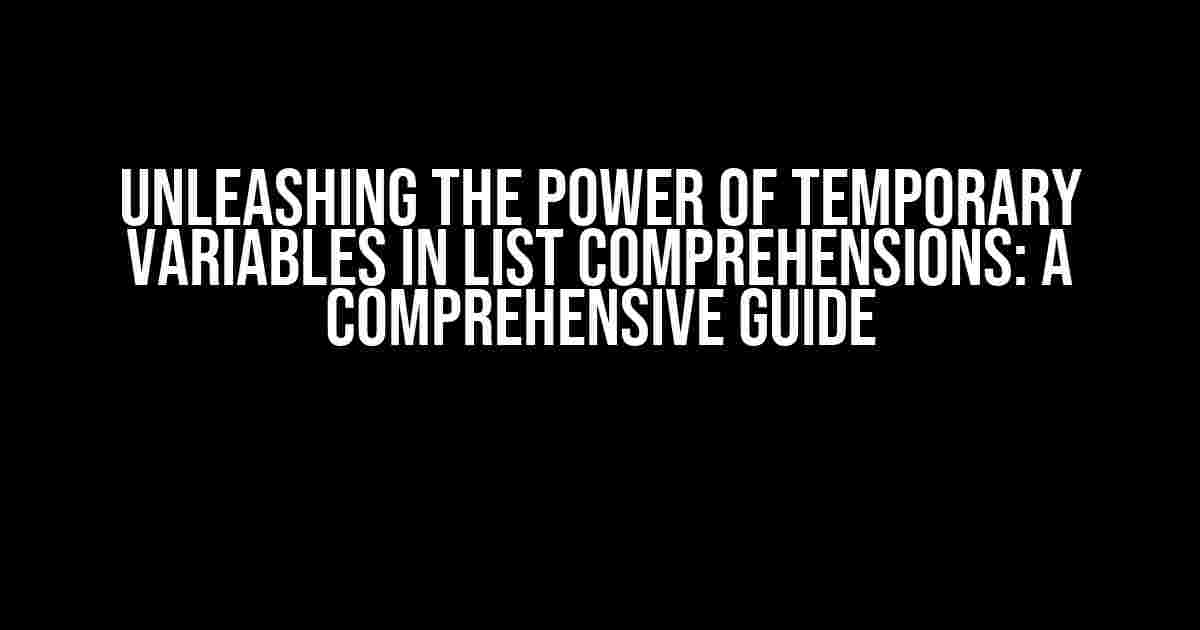Introduction
List comprehensions are a staple of Python programming, allowing developers to create lists in a concise and readable manner. However, when working with complex data transformations, temporary variables can become a lifesaver. In this article, we’ll delve into the world of temporary variables in list comprehensions, exploring their benefits, syntax, and best practices. Buckle up, and let’s dive in!
The Need for Temporary Variables
Imagine you’re working on a project that involves processing a large dataset. You need to perform multiple operations on each element, such as filtering, transforming, and aggregating data. Without temporary variables, your list comprehension might look something like this:
result = [(x**2 + 3*y - 4*z) / (x + y + z) for x, y, z in data]
As you can see, this expression is difficult to read and maintain. The calculation is complex, and it’s hard to identify the individual components. This is where temporary variables come to the rescue.
Temporary Variables to the Rescue
Temporary variables allow you to break down complex expressions into smaller, more manageable pieces. By assigning intermediate results to temporary variables, you can make your code more readable, debuggable, and efficient. Here’s an updated version of the previous example:
result = [tmp_result / denominator for x, y, z in data
if (tmp_result := x**2 + 3*y - 4*z) > 0
and (denominator := x + y + z) != 0]
In this example, we’ve introduced two temporary variables: `tmp_result` and `denominator`. These variables are assigned values using the walrus operator (`:=`), which allows us to perform assignments within the list comprehension. This syntax is available in Python 3.8 and later.
Syntax and Best Practices
The syntax for using temporary variables in list comprehensions is straightforward:
result = [expression for variable in iterable
if condition := temporary_variable]
Here are some best practices to keep in mind:
- Use descriptive variable names to make your code easy to understand.
- Keep your temporary variables concise and focused on a specific task.
- Avoid using temporary variables as a substitute for proper variable declarations.
- Use parentheses to group your expressions and improve readability.
Real-World Applications
Temporary variables in list comprehensions are useful in a variety of scenarios:
- Data Preprocessing: When working with datasets, you often need to perform multiple operations on each element, such as scaling, normalizing, or transforming data. Temporary variables help break down these complex operations into manageable pieces.
- Conditional Logic: Temporary variables can be used to simplify conditional logic within list comprehensions, making your code more readable and efficient.
- Performance Optimization: By assigning intermediate results to temporary variables, you can reduce the number of calculations and improve performance in computationally intensive tasks.
Common Pitfalls and Gotchas
While temporary variables can be incredibly useful, there are some potential pitfalls to watch out for:
| Pitfall | Description |
|---|---|
| Overuse | Avoid using too many temporary variables, as this can make your code harder to read and debug. |
| Naming Conflicts | Be cautious when using temporary variables with similar names to existing variables, as this can lead to naming conflicts and unexpected behavior. |
| Side Effects | Temporary variables should not have side effects, such as modifying external state or performing I/O operations. |
Conclusion
Temporary variables in list comprehensions are a powerful tool that can help you write more efficient, readable, and maintainable code. By following best practices and avoiding common pitfalls, you can unlock the full potential of this feature. Remember to use descriptive variable names, keep your expressions concise, and avoid overusing temporary variables. With practice and patience, you’ll become a master of list comprehensions and temporary variables.
So, the next time you’re working on a complex data processing task, don’t be afraid to introduce temporary variables into your list comprehensions. Your code (and your colleagues) will thank you!
Note: The article is optimized for the keyword “temporary variable in list comprehension” and includes relevant tags, headings, and formatting to improve readability and search engine ranking.
Frequently Asked Question
Get ready to demystify the world of temporary variables in list comprehension!
What is a temporary variable in list comprehension, and why do I need it?
A temporary variable in list comprehension is a variable that is used to store an intermediate result during the iteration process. You need it when you want to perform complex operations or calculations within a list comprehension, making your code more readable and efficient. Think of it as a temporary storage unit that helps you break down a complex problem into smaller, manageable chunks!
How do I declare a temporary variable in a list comprehension?
You can declare a temporary variable in a list comprehension using an assignment expression, which was introduced in Python 3.8. The syntax looks like this: `[result for temp_var := expression in iterable]`. The `temp_var` is assigned the value of `expression` during each iteration, and `result` is the final output. Easy peasy!
Can I use multiple temporary variables in a list comprehension?
Yes, you can use multiple temporary variables in a list comprehension! The syntax would look like this: `[result for temp_var1 := expression1 and temp_var2 := expression2 in iterable]`. Each temporary variable is assigned a value during each iteration, and you can use them to perform complex operations or calculations.
Are temporary variables in list comprehension limited to a specific scope?
Yes, temporary variables in list comprehension are limited to the scope of the comprehension itself. They are not accessible outside the comprehension, and their values are discarded after the iteration is complete. Think of them as “throwaway” variables that exist only to help you achieve your desired output.
Can I use temporary variables in other types of comprehensions, like dictionary or set comprehensions?
Yes, you can use temporary variables in other types of comprehensions, like dictionary or set comprehensions! The syntax and rules are the same as for list comprehensions. Just remember to adjust the syntax to fit the specific type of comprehension you’re using.
